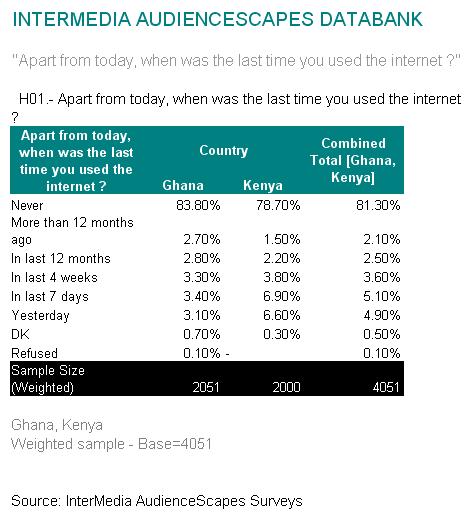AudienceScapes data reminds of Internet reality
Africans may be excited about the Internet, but they lack the necessary skills and guidance to use a computer, at least according to recent surveys conducted in Ghana, Kenya, Tanzania, and Zambia. AudienceScapes, an “online tool and research program providing essential media use and communication information on developing countries from a bottom-up perspective, based on in-depth analysis”, polled thousands of individuals in Kenya, Tanzania, Ghana, and Zambia on media perceptions and usage habits. The project utilizes:
- a country research program with national surveys.
- research-based evidence for assessing local needs in media, communication technologies, development information and development policy.
- a website providing user-friendly access to data, research reports, analysis, a practitioners’ field blog, discussion pages, and more.
Data from African nations that have been surveyed shows :
- approx. 10% have a working computer at home
- 6.5% have working Internet access at home (computer or mobile)
- 86% never connected to the Internet via mobile phone
- Of 4,051 people surveyed in Ghana and Kenya, only 3.6% had used the Internet in the past 4 weeks
- Of 4,003 people surveyed in Tanzania and Zambia, 87.5% never use the Internet
- The most common reason not to use the Internet is from a lack of knowledge how to, followed by ignorance of what the Internet is
- The lack of access was the 3rd most common barrier to Internet use
- Of those who used the Internet in the past 12 months, most do so for email and news
- Only 9.1% perform financial transactions online
- Only 8% purchase a product or service during a given month
- About half of Internet users access social networking sites
- About half of Internet users access government sites
- 64% of Internet users have watched a video online in the past year
- In general, Tanzania lags the other 3 surveyed countries in terms of Internet activity
In terms of mobile:
- most have owned a phone for a couple of years
- mainly use the phone for voice, but 1/2 of respondents use it for SMS
- less than 10% use the phone for Internet
- most feel phone is easy to use, but difficult to find strong signals and/or repair facilities
These statistics seem in line with numbers from other sources, but one must wonder what proportion of the respondents come from rural areas. Although most of Africa is rural, it is often the urban areas that drive technological innovation. Either way, the general question mark surrounding computing needs to be addressed universally by governments in the form of educational programs. Additionally, the data suggests that these nations may not leapfrog the traditional computer and quickly adopt mobile Internet. The 10% mobile Internet usage rate suggests that prices must drop and/or coverage areas must increase. After all, when Ghanaians, Kenyans, Tanzanians, and Zambians go online, they become very active.













 Twitter
Twitter Facebook
Facebook Pinterest
Pinterest